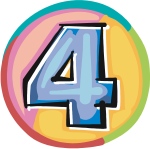 It’s official. I am a 31-year-old senior citizen. More and more frequently, I find myself saying the stereotypical old man things:
It’s official. I am a 31-year-old senior citizen. More and more frequently, I find myself saying the stereotypical old man things:
“Why, when I was your age…”
“The fashion of these kids today!”
I even tell my students about how much farther I had to walk to school than they do. That my book bag was at least 40 pounds. Fortunately, at least, I didn’t try to convince them it was uphill both way.
What really brought this sentiment home to me, was a TIME article entitled, “Top 10 Things Today’s Kids Will Never Experience,” published Thursday, Aug. 19, 2010.
The list:
After a kiss goodbye to the dream that I was still a young man , I realized that this article could make a great history lesson.
All teachers should show their students this list. Even if you are not history teachers, there are Cross Curricular Activity opportunities for technology, social studies, writing and reading for your class. Or if you are a parent, you can still use this article with your kids.
We might start by trying to convey how quickly things are developing and changing in our lifetimes. Everyone of the things on this list was most likely around when we were their age. At the Museum of Natural History, I saw an exhibit explaining how the technology used in farming hadn’t changed for hundreds of years, and then suddenly advances were being made every decade, then every year, and now almost daily. Our students will hopefully appreciate how living in the Information Age, has dramatically expedited the process of innovation.
Even education is quickly changing. Most subscribers to my blog are the brave educators incorporating blogs, twitter, PLN’s, Facebook into their lessons. None of these words existed when I was a middle school student.
 Can you imagine some of the teachers we had in middle school receiving horrible evaluations from today’s administrators? “Mrs. Smith during your surprise observation, all you did was lecture! Where was your use of technology? You only used whole group instruction! Where was the hook? Where was the closure? And not a single Cross Curricular Activity! I didn’t see your objectives or NCLB standards posted anywhere in your class! Your assessments are purely multiple choice! There was no differentiation for ELL students, nor were there any accommodations for your I.E.P students!”
Can you imagine some of the teachers we had in middle school receiving horrible evaluations from today’s administrators? “Mrs. Smith during your surprise observation, all you did was lecture! Where was your use of technology? You only used whole group instruction! Where was the hook? Where was the closure? And not a single Cross Curricular Activity! I didn’t see your objectives or NCLB standards posted anywhere in your class! Your assessments are purely multiple choice! There was no differentiation for ELL students, nor were there any accommodations for your I.E.P students!”
(That was more fun to imagine than I care to admit.)
 The next way to utilize this list in a lesson is to have our younger generations question the validity of this list. Do they really believe all of these predictions will come to pass? I know the extinction of printed books won’t happen in classes of my wife or my own. Many teachers like us can get entire boxes of books from yard sales for a dollar a box and then just give them to our students (don’t you love how generous Americans get at yard sales when you tell them you are buying books for your school? I love the generous attitude of people in my neighborhood!). If yard sales run out of books then our classes will publish their own books using our computer lab printers. Failing that, we will make our own printing presses like Benjamin Franklin. If that fails we will make students copy important texts like the monks used to do before the printing press. I am imagining students furiously copying To Kill a Mockingbird with a quill by candle light. Hmmm… maybe a new lesson plan in the works..
The next way to utilize this list in a lesson is to have our younger generations question the validity of this list. Do they really believe all of these predictions will come to pass? I know the extinction of printed books won’t happen in classes of my wife or my own. Many teachers like us can get entire boxes of books from yard sales for a dollar a box and then just give them to our students (don’t you love how generous Americans get at yard sales when you tell them you are buying books for your school? I love the generous attitude of people in my neighborhood!). If yard sales run out of books then our classes will publish their own books using our computer lab printers. Failing that, we will make our own printing presses like Benjamin Franklin. If that fails we will make students copy important texts like the monks used to do before the printing press. I am imagining students furiously copying To Kill a Mockingbird with a quill by candle light. Hmmm… maybe a new lesson plan in the works..
Scary tangent thought: if books weren’t made anymore and eventually all lost, what if the internet crashes?! Would we have lost all record and history of Civilization?
Finally,we can have our children write/blog their own list of gadgets and ideas that they predict won’t be around when they are old men like me. I’ve read a number of articles explaining that most middle school students physically have not yet developed the part of the brain needed for long term thinking. This is partly what makes them so impulsive and such bad decision makers. This lesson can be a fun way for them to get those brain cells in gear.
What do you think? Does this sketch of a lesson plan seem feasible? Have you tried something like it? Please let me know!
Read Full Post »
 The Four Steps
The Four Steps






 to
to




